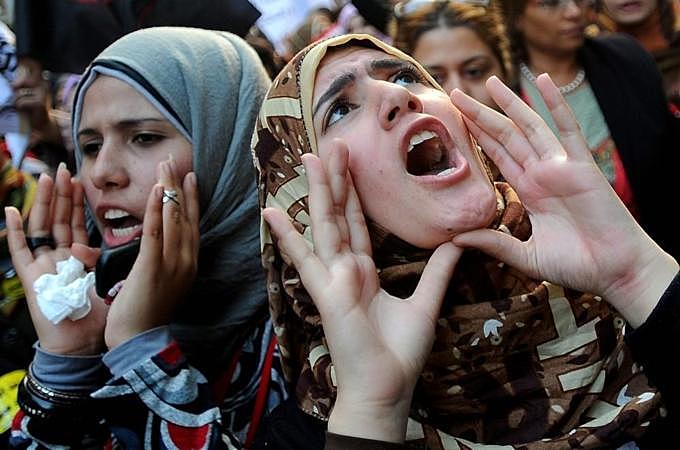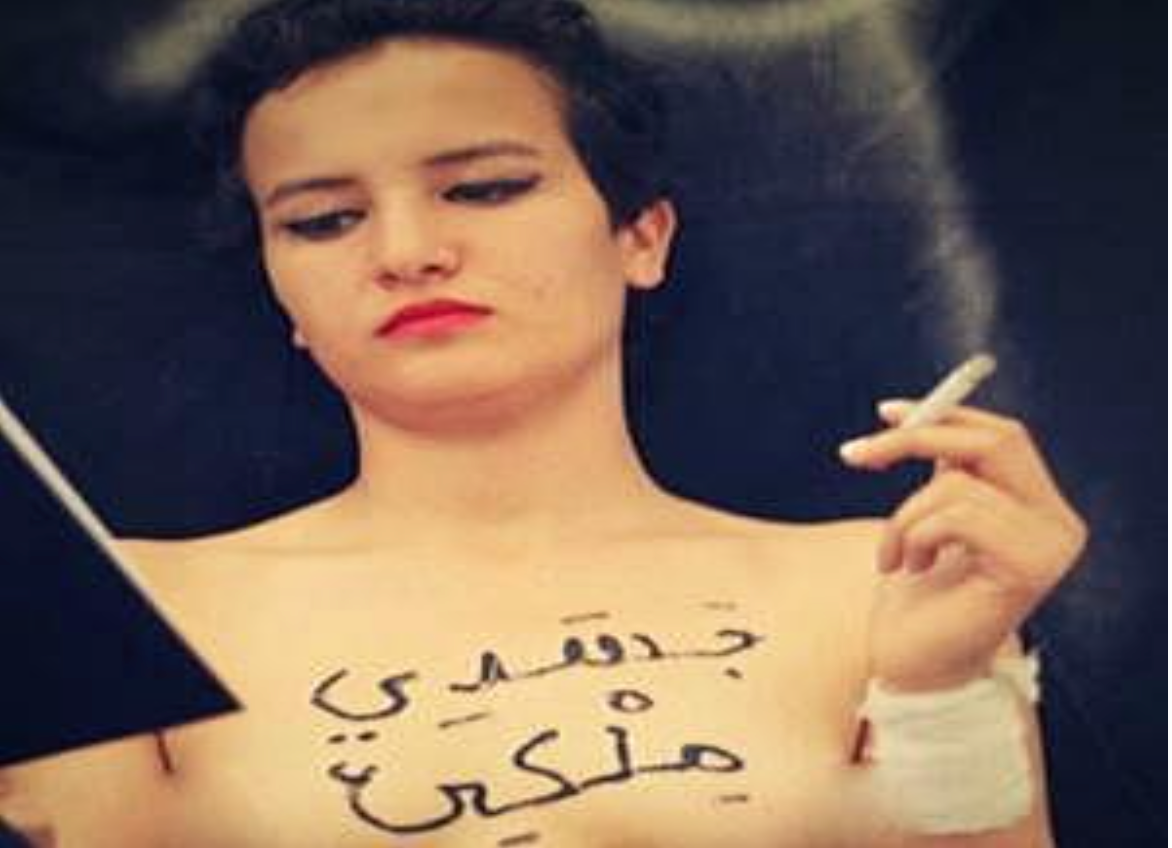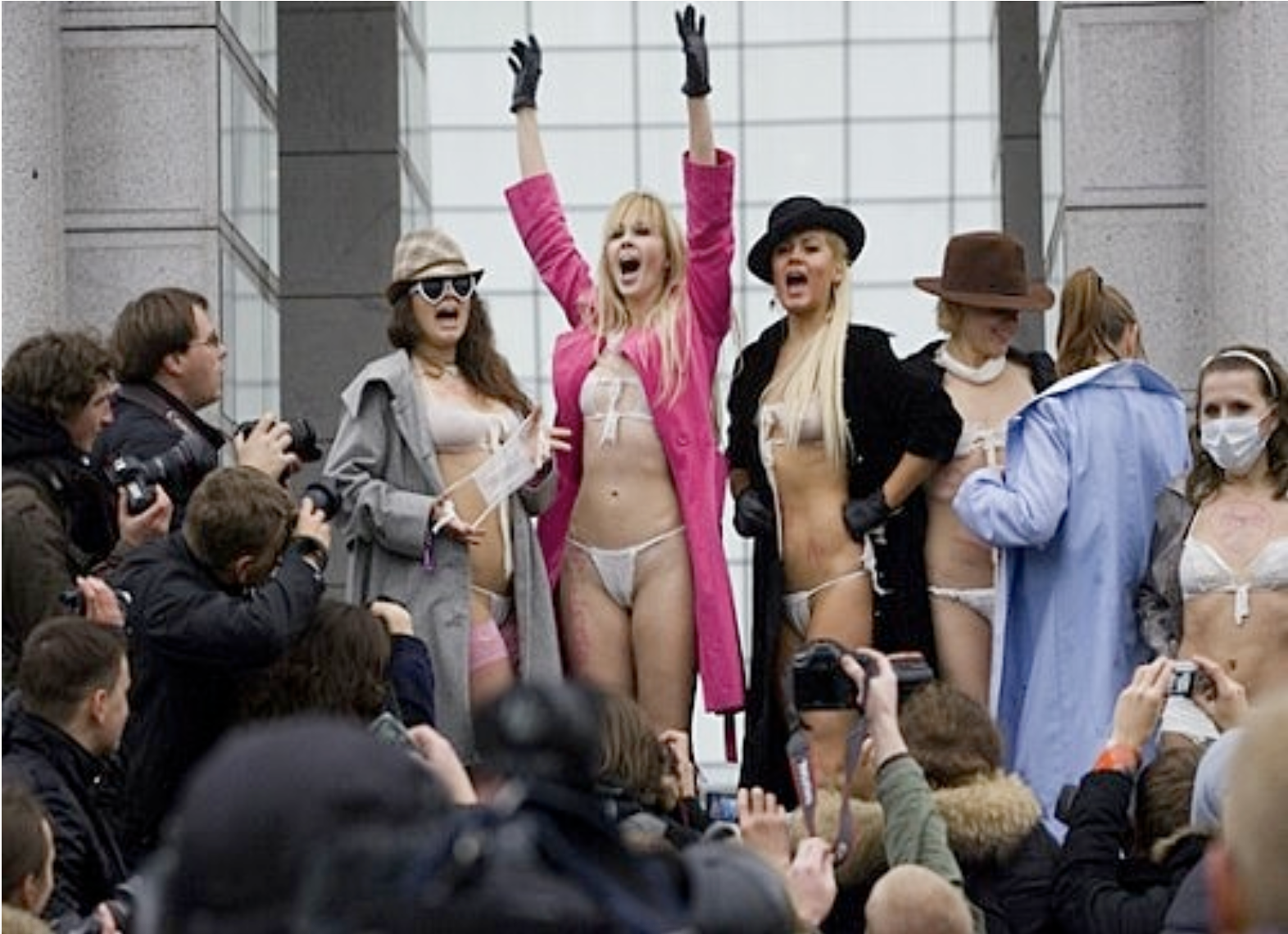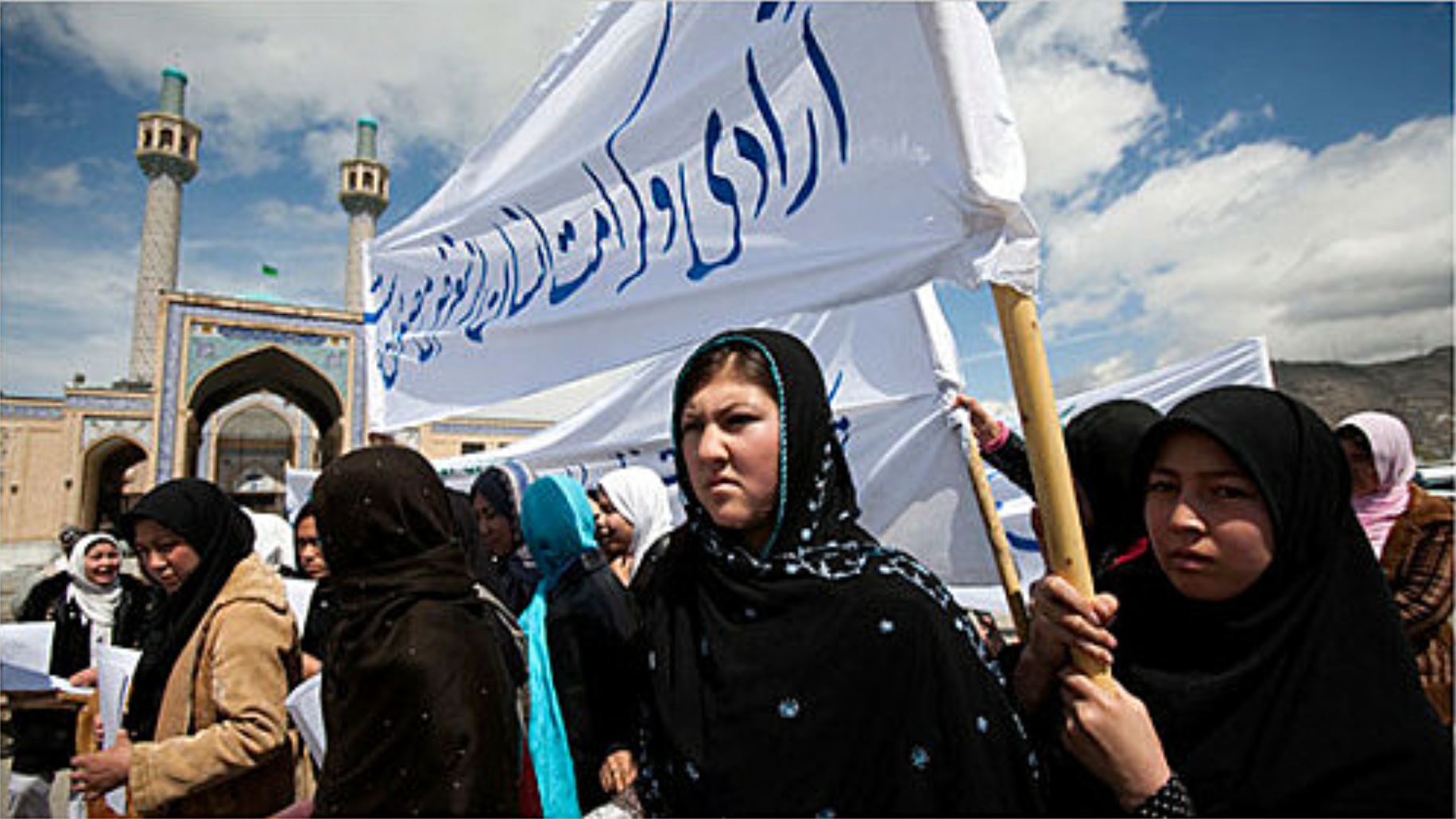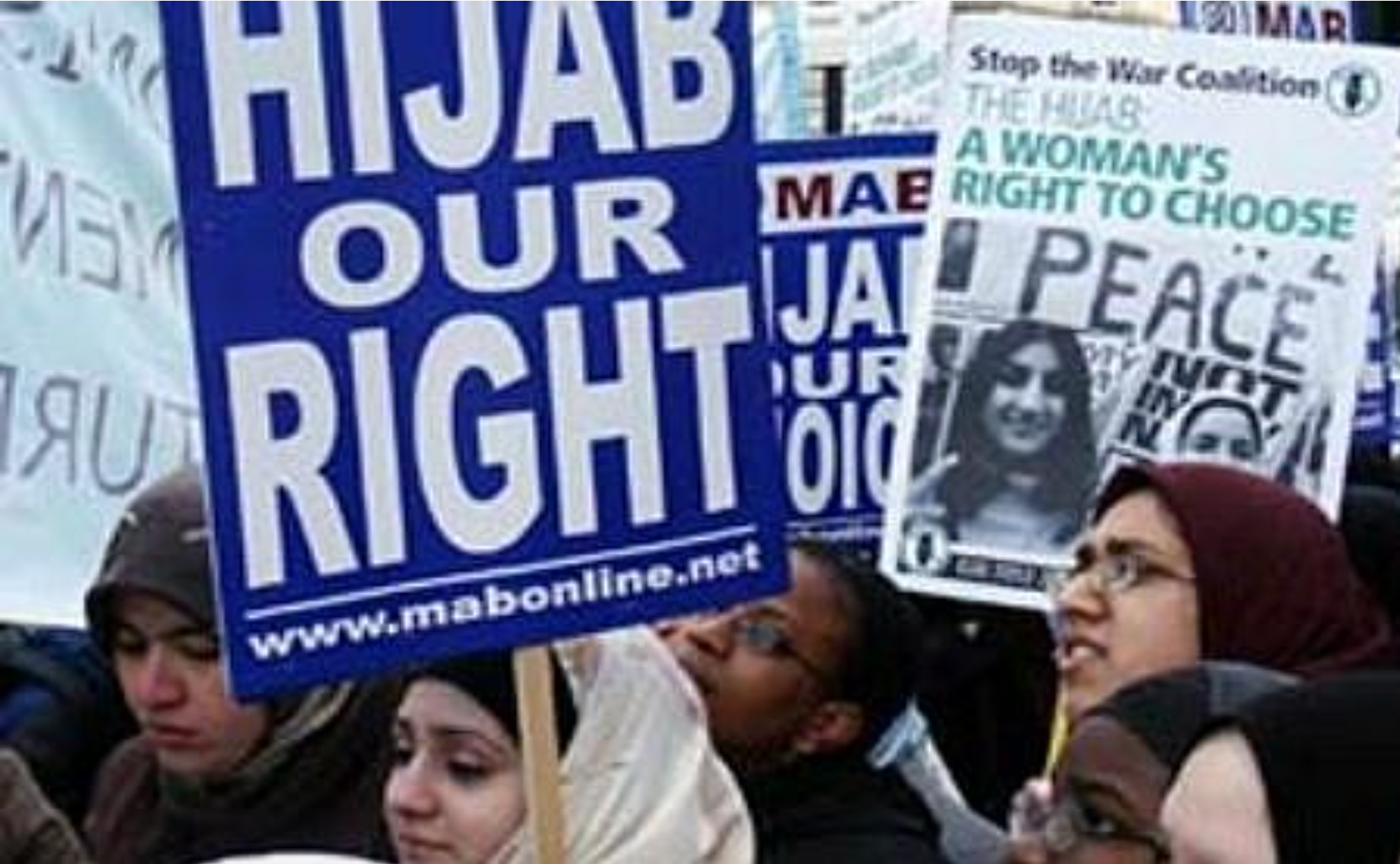On Femen, Hijab, and the Muslim Feminist (or, How I Am Not an Elusive Unicorn)
It's official - Muslim women need saving from their own religion, and an organisation called Femen have decided they're just the blonde and beautiful Westerners to do it. Saziah Bashir on why being a Muslim and being a feminist can be a thing, despite what some well-meaning missionaries believe.
In April this year, a Tunisian woman named Amina Tyler posted photos of herself on her Facebook - smoking a cigarette in one, a fantastic shade of red lippy in others – but topless in all, with phrases like “My body is my own and not the source of anyone’s honour” and “Fuck your morals” streaked across her bare torso. I agree with the sentiments expressed – the former, especially, is an essentially feminist battlecry. Too often a woman’s hymen gets to double as the gatekeeper of realms of honour and good character, and the burden of society’s moral integrity unfairly, stupidly, weighs on the hems of our skirts. Every woman’s body should be her own – not a space for nobody else’s battles or bullshit. At first glance, Amina’s protest is provocative, but not so problematic as to garner the response it did.
But this is Tunisia, and the response was big. Political and religious leaders called for her to be subjected to corporal punishment. She received widespread criticism and even death threats (although, so did unpopular contestants on Australia’s My Kitchen Rules this season, so really, people will get disproportionately pissed off about anything won’t they?). I’ll say it upfront, so there is no room for doubt: I do not think Amina Tyler should be persecuted for using her naked body to convey her political beliefs. Her body is her own to use, however she pleases.
Something needed to be done to ensure this young woman’s safety, no matter how badly she may have offended conservative local sensibilities in a Muslim state, because in a wider context she was just attempting to exercise her rights. Amina’s chosen form of protest also happened to reflect her affiliation with outspoken Ukrainian feminist group Femen. And where their response to Amina’s plight was an extended social media stunt called “Topless Jihad Day” my response to their response was less organised, but more reflexive. I had to roll my eyes.
I would prefer not to dwell on Femen or their chosen form of protest for Amina. There’s been quite a response to the whole thing already, worldwide, both for and against. But Femen just exemplify so well precisely what has been a constant source of frustration for me in relation to the ignorance, lack of understanding or perhaps deliberate exclusion of Muslim feminist movements within the ambit of wider feminst rhetoric. So I’ll use them instead to air out my concerns on the two things that have come to the forefront in the wake of all this. Firstly, the hijab issue. And I how I really truly believe everyone needs to shut the fuck up about the hijab issue already. Secondly, how Muslim Feminists are a Thing. Like, we’re real. We’re here, we’re not sparkly unicorns, we exist, so people need to just deal with it somehow.
But let’s get back to Femen for a bit. Oh, Femen. Where do I start. Do I even bother? Having endured the horrific and racist images that emerged from “Topless Jihad Day” of topless Femen activists wearing fake beards and towels as turbans – fucking towels, honestly, don’t even get me started on the bloody turbans – mimicking Muslim prayers with upraised arms on a prayer mat, is there any meaningful talking to or about Femen? They trade in shock value and their politics is, at best, incoherent.
Despite my considerable efforts (a courtesy Femen would not extend to me, I am sure, since they don’t believe I exist), I cannot understand what they are trying to achieve, and how they purport to do so with their tactics. Femen are supposedly taking back and politicizing their sexuality; their naked torsos are meant to embody hatred for patriarchy. In Femen leader Inna Shevchenko’s own words, they are the “naked shock troops of feminism.”
I am all for non-violent protest, even in the nude. Freedom of expression is extremely important. I don’t have a problem with exposed tits. I like tits, I think they’re fantastic. I have a pair of my own and we get along splendidly. But Femen’s preferred form of protest generally, and in the case of “Topless Jihad” specifically, is inherently problematic.
Femen isn’t ‘politicizing’ women’s bodies, because women’s bodies are already a highly politicized space. This is why even decades after their Supreme Court decided on the matter, women in different states in the US are still fighting for access to birth control and reproductive healthcare. Nothing gets American political debates going like the uterus (except maybe guns). Domestic violence and sexual violence are largely perpetrated on women’s bodies. Slut shaming, rape culture, sexual objectification, body politics, it’s all about our bodies. But the image of thin, white female bodies are everywhere in the West. They are used to sell everything from shoes to shaving cream. How is Femen’s protest achieving anything other than exactly what patriarchy has already perfected, to reduce women down to our bodies? Let’s be honest, we’re not so far along the feminist narrative in the West that our tits, no matter why they are exposed or with how much of our consent or active desire, have ceased to be a source of titillation and exploitation for those, especially men, who could give a fuck about our rights. Putin openly admitted to “enjoying” Femen’s protest against him. What, then, was the point?
What of the lack of body diversity in Femen activists? I see nothing but able bodied white skin, with very little difference in size and no acknowledgement of the cisgendered privilege attached to breasts. Where is the shout out, or even the most basic acknowledgement, of those women in Africa who used naked protests (meaningfully) long before Femen’s conception?
Meanwhile, I’m genuinely curious as to what kind of feminism Femen is advocating when their activists attack sex workers while shouting epithets like “Go rape yourself.” Femen supporters responded to Muslim women who spoke up against their topless jihad by calling them “stupid slaves.” Shevchenko’s own response was essentially that no Muslim woman truly chooses to don a headscarf even if she claims she does, while conflating the words Muslim and Arab with some (bonus orientalism!) reference to harems thrown in, just in case we were lulled into a false sense of security over here about the depth of her understanding And if we were wondering how she really feels, she’s also stated outright that a “Muslim feminist” is oxymoronic to her.
The West (and I use the generalization for consistency’s sake, but begrudgingly because I wish we weren’t still stuck on the same record) using the concept of liberating Muslim women as a cover to further its own agenda is old stuff. It slips perfectly into a Savage-Victim-Saviour approach to doing human rights (if you want to be generous and call colonialism, neo-colonialism and globalization some sort of rights-based approach to conquest, sure). Muslim men and Islam in general are painted as the savage oppressor; poor, oppressed Muslim women, whose oppression is symbolized by their veil, are the victim; and enlightened Western culture is the saviour. Rhetoric belied by this formula was used to justify British occupation of Muslim states such as Egypt centuries ago. It was also a handy chestnut to justify the war in Afghanistan.
The veil, or hijab, or niqab, or burkha (I use the term loosely to signify some form of head covering used by Muslim women, though my inability to find a single word to cover it – pardon the pun – should be indicative of how this is not a simple thing) is an easy symbol to target and galvanize this sort of saviour narrative around because it is a visible point of difference. It’s so obviously a sign of an Other, but with the tantalizing hint of some familiar trope underneath – a damsel in distress! – that it supplies the perfect focal point for Muslim women’s bodies to be politicized on perhaps a grander, more international scale than any other. The French publicly unveiled Algerian women in the 50’s, with pomp, publicity and ceremony: as if to say, here she is, she has arrived, the modern Algerian woman, and it is the civilized, non-Muslim French saviour birthing her.
The funny thing is, the West shares this fixation on the covering or uncovering of Muslim women with the most hardcore of religious fundamentalists. And the Western feminists who question my identity as a Muslim feminist (“You might be a feminist but you don’t wear a head scarf thingy so you’re not like really Muslim, like all Islamic, are you?”) share this sentiment with the same, often male, fundamentalists. That’s too much irony, even for me (and I live off Wellington’s Cuba Street, so you’d think I’d be pretty immune to the stuff by now).
It’s 2013, and I shouldn’t have to tell capable adults how misguided this veil fetishism is anymore. Scholars still debate the interpretations of modesty in religious texts and Muslim feminist scholars have pointed to the fact that historically, religious texts have been interpreted by men. You don’t need my lived experience or firsthand beliefs to inform you that the hijab is a complex symbol, not only of oppression as Shevchenko would have you believe, but of history, of resistance, of post-colonial feminism, of class and socio-economic status, of reassertion of migrant identity, of renewed assertion of religious identity in an increasingly Islamophobic world and of a deeply spiritual and personal observance of faith.
My mother chose to abandon her hijab while she was living in a Muslim country in her youth, and chose to don it again in her early forties when she moved to New Zealand. I choose not to wear a hijab for two reasons: a) I personally don’t interpret modesty in that manner and b) aesthetically it just doesn’t appeal to me, especially because I have a really round face but not like in that cute Mila Kunis way, you know? I know sisters who grew up in the same household, one choosing to wear the hijab and the other choosing not to. I have girlfriends who came to it all on their own and often in direct opposition to their mothers’ or husbands’ wishes, who preferred them not to wear it at all.
We all have our diverse stories and we’re telling them, but are the people who supposedly care doing us the courtesy of listening? The deliberate faux-ignorance of the West ceases to be a feasible excuse when those narratives have migrated to their countries and communities, to their social networks. Especially when you have Muslim women taking to Facebook and Twitter and Tumblr and screaming LISTEN TO ME, and yet Western feminists are instead choosing to do the equivalent of patting us on the head and saying “No, dear, no.” I am aware that there are of course those Muslim women without a voice altogether. So if those of us who truly believe we have one can’t even be heard, what hope do they have of ever finding theirs?
Of course, this fixation on what Muslim women wear is just an extension of the usual, borderless, bullshit of fretting over what all women wear. It is either too much (poor, oppressed backward ethnics) or too little (trashy slut, she’s pretty much asking to be raped in that skirt) and the only thing they have in common is what this approach achieves to further the discourse on equality (ie: fuck all).
Policing what women wear is precisely the patriarchal crap that caused trouble for Amina, so why is it used against Muslim women in the guise of liberation? It is a distraction from the real issues and often a smokescreen for what’s really going on. In Amina’s case, we stopped talking about basic protest rights in Tunisia and started talking about hardline Islamists. We started demonizing the Tunisian state, while ignoring a remarkable revolution in 2011 fighting for equally fundamental rights, and ending a 24-year dictatorship and leading to the current government being formed from free and democratic elections for the first time in decades. It’s the same smokescreen that obscures the physical, economic, political and social devastation in Afghanistan and Iraq in the wake of the saviours who have left the women “free” to take off their veils but full of the trauma of war. So why is hijab still the go-to topic of conversation in the West when somone says the words Muslim and woman in the same sentence? Can’t we just stop talking about the hijab thing already?
I get that the dominant Western media message on Islam is that it’s an inherently violent religion and we’re all terrorists and blah blah blah but as with the hijab thing, y’all can Google as much as I can, and I don’t feel like I should be informing people about Islam anymore. I am sick to death of defending Islam. I feel like all any Muslim’s been doing since 2001 is defending it and apologizing for the extremists, as if we can’t have a conversation without me setting out a little history lesson and list of disclaimers on my religion first. People shouldn’t need me to explain to them that Islam is a religion and not a culture, and that therefore when they talk to me about Muslim culture being inherently misogynistic (as if the billion or so Muslims spanning the globe across continents, speaking different languages and coming from completely different socio-economic and political backgrounds somehow subscribe to this monolithic “Muslim culture” like we’re all one big happy backwater hick homogenous family) it makes me want to put my head through a wall. I am fucking done with explaining that my religious Muslim parents aren’t hateful psychopaths barely repressing their violent tendencies (my dad is a pot-bellied and jovial engineer, for crying out loud) and that my rugby and Bon Iver-loving accountant brother is not potentially a terrorist. And that nor am I, because of the tragic combination of my vagina and the religion I subscribe to, especially oppressed.
I shouldn’t have to reiterate that Islam isn’t founded on principles any more violent than Christianity or Hinduism, for example. I shouldn’t have to wring my hands and say ‘oh but Islam codified, way back when, women’s independent right to own and administer property, to divorce and remarry with their consent being central to the marriage contract, and inherit their fathers’ and husbands’ property even when there are male heirs’ (a concept which would, in all honesty, have destroyed the entire basis of the plot for Downton Abbey).
It is as possible to be a Muslim feminist as it is to be a Christian feminist, or a Hindu feminist or an American feminist. Nor do I believe feminism is the sole prerogative of secularists or athiests. That some Muslim countries happen to be extremely patriarchal and apply that paradigm to their interpretation and practice of Islam is definitely a concern for me. Newsflash: almost all societies are patriarchal to varying degrees. But I shouldn’t have to remind everyone of rape statistics from South Africa, honour killings by non-Muslim Indians, female genital mutilation in non-Muslim African states, sex slavery and sex trafficking in Thailand and Europe, rape culture EVERYWHERE, domestic violence EVERYWHERE, barriers to access to education and employment and healthcare and civil society and pay inequality and glass ceilings EVERYFUCKINGWHERE.
My feminism is about equality. I believe in the unequivocal right to social, political and economic equality of every person regardless of gender, while understanding this struggle takes place within patriarchal societies that perpetuate systemic and structural inequality. My feminism is necessarily intersectional because I found that the best approach to reconciling my identity. My feminism is post-colonial, because I see that the space I occupy in feminism is geo-politically contentious ground populated with identities fractured by a colonial past, simultaneously torn apart and shaped by it, and the only way I can comprehend who I am now is to accept who I was, historically. It is a simple thing to me, then, as a Muslim feminist, to respect Amina Tyler’s right to wear as much or as little as she chooses. I expect other feminists to return the same respect, in the ethos of equality, for a Muslim woman’s right to wear equally as much or as little as she chooses. The only issue that remains, then, is that in our shared pursuit of equality we should stand in solidarity against the patriarchal structures that make our feminisms what they are: a struggle.
And this has been difficult for me, as I am loathe to be prescriptive or assume any authority, and I find no sense of catharsis here. Writing about this is making me sad. I am sad that we are still talking about this. I am sad that Muslim women are still recovering from the trauma of being “saved” by white men only to now face the daunting prospect of being “saved” by white women. I’ll be the first to admit my sisters are strong, but God (mine and anyone else’s) help us having to survive all this well- intentioned paternalism all over again. I thought we were past this, I thought we were making progress. But we are clearly not there yet. Because Femen is still doing what it does, and they are not the first, nor I daresay the last, and they are only symptomatic of how far we are from there – there being where I want to the greater feminist discourse to be.
I struggled with talking about this because I struggle with speaking for or on behalf of anyone, especially women. But if there is one thing I have legitimate authority to speak on, it is myself, and you can quote me on this: I am a Muslim Feminist. Femen cannot speak for Muslim women because nobody can speak for Muslim women. Muslim women will speak for themselves. We have the right to define our own struggle. We have the right to define our emancipation. For some, that freedom may take the form of a topless protest and for others it may be wearing the biggest, blackest fucking burkha you ever saw. This fight is for Western feminists in so far as equality is every feminists’ fight. But in other ways, it is not a shared struggle, and in that instance this is not the space for Western feminism to dominate the conversation, but the role of the Western feminist is to stand in solidarity, as an ally, as Muslim women frame their own narrative. We are here. We are speaking. Listen.
